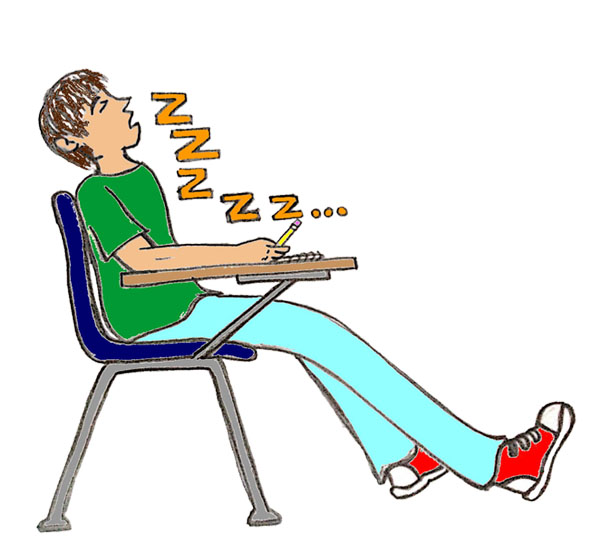Have good grades, have a social life, get enough sleep. Choose two.
There are days when I get to school at 7:15 a.m. and don’t leave until 6:30 p.m. Of course education is my biggest priority as a teenager, but when did going to school become a full-time job? I guess it’s my fault that I chose to do a sport and an after school class that require me to stay so late, but I’ve been told that if I don’t do 20 extracurriculars and take all AP classes, colleges won’t accept me, or even worse, they won’t give me scholarships.
For many, if not most of us, 24 hours is not nearly enough time to go to classes, do sports, do other extracurriculars, study for tests, do homework, have a social life and get enough sleep. This jam-packed schedule is taking a huge toll on the mental health of high school students.
It seems like every Monday, the first ten minutes of my first period class are spent discussing how horrible the upcoming week will be. Every week gets worse, and the weekends are no help. My Friday nights involve me vegging out by watching Netflix or falling asleep at 6 p.m. and not waking up until 9 a.m. Saturday morning because I feel like I deserve a break from all the stress of the week. Saturdays are reserved for spending time with friends and not starting homework until the evening. Sundays are gone because of church and my three-hour evening classes. There is no rest for the overworked.
I know that many days, my friends and I have stumbled bleary-eyed into class, exhausted from our less than five hours of sleep. I’m not trying to disrespect my teachers when I doze off in class—it’s just impossible for me to keep my eyes open. And really, who benefits when I keep hitting my head on my desk because I can’t stay awake?
Even though I’m often too sleep-deprived to function properly, fear of falling behind in my classes drags me to school everyday, red-eyed and half dead. I have to wonder if it’s really worth it (spoiler: it’s not). To top it all off, by graduation, teenagers who stayed up later than their early-to-bed counterparts had “lower GPA scores and were more vulnerable to emotional problems” (UC Berkeley News Center).
Failing to get enough sleep can have consequences much more serious than just bad test grades. By the second semester of sophomore year, most high school students have gotten their license and are driving themselves to school. Do we really want teenagers, notorious for their unsafe driving, endangering the lives of countless other motorists and pedestrians by operating a more than 2,000 lb killing machine on four hours of sleep? The National Highway Traffic Safety Administration pegs the number of fatal drowsiness-related crashes among young drivers (ages 15-24) at 1,500 per year. Ensuring that everyone who drives (especially teenagers) gets a sufficient amount of sleep is in the interest of anyone and everyone on the road in this country.
Solution?
Let’s start school later.
Towns in Minnesota, Massachusetts and Kentucky have experimented with pushing back school start times with moderate success. For example, instead of having classes between 7:25 a.m. and 2:10 p.m., one school switched to 8:30 a.m. to 3:10 p.m. classes. Administrators reported back to The Center for Applied Research and Educational Improvement (CAREI) at the University of Minnesota and found that the number of tardies and absences went down, students got an hour more of sleep and were generally more alert in their classes.
As any psychologist will tell you, the teenage years are transformative ones, physically, mentally, and very importantly, biologically.
Research has shown that melatonin secretions start and stop later in teens, causing us to fall asleep and wake up later. This means that it is harder for us to fall asleep before 11 p.m. even though we get tired earlier.
School schedules are more conducive to adult sleep schedules than to teenage ones. Adults only need 7.5 to 9 hours of sleep so it’s no big deal to ask teachers to start their days at 7:45; asking teenagers to do that is borderline cruelty.
The National Sleep Foundation recommends that teenagers get 9.25 hours of sleep per night, but according to a survey I conducted in my AP Statistics class, the average Trinity Prep senior gets only 6.4.
We might also take a cue from our Latin American neighbors and implement siestas (“naps” for those of us who don’t take Spanish).
According to the Mayo Clinic, daytime naps can boost performance, speed up reaction times and improve memory; I’m sure sixth period teachers everywhere would rejoice at previously sluggish students becoming more energized.
Although most of us are figuring out how to make less sleep work, eventually teens, parents and administrators will have to concede that students will never reach our full potential without sufficient sleep.










Privacy Gateway • Dec 5, 2013 at 11:44 pm
Can we ask Mr. Maughan to start school later? Or start a petition for that